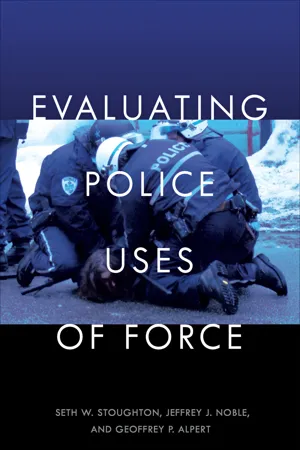
eBook - ePub
Evaluating Police Uses of Force
- 337 pages
- English
- ePUB (mobile friendly)
- Available on iOS & Android
eBook - ePub
Evaluating Police Uses of Force
About this book
Evaluating Police Uses of Force provides a critical understanding and evaluation of police tactics and the use of force.
Police violence has historically played an important role in shaping public attitudes toward the government. Community trust and confidence in policing have been undermined by the perception that officers are using force unnecessarily, too frequently, or in problematic ways. The use of force, or harm suffered by a community as a result of such force, can also serve as a flashpoint, a spark that ignites long-simmering community hostility.
In Evaluating Police Uses of Force, legal scholar Seth W. Stoughton, former deputy chief of police Jeffrey J. Noble, and distinguished criminologist Geoffrey P. Alpert explore a critical but largely overlooked facet of the difficult and controversial issues of police violence and accountability: how does society evaluate use-of-force incidents? By leading readers through answers to this question from four different perspectives—constitutional law, state law, administrative regulation, and community expectations—and by providing critical information about police tactics and force options that are implicated within those frameworks, this book helps situate readers within broader conversations about governmental accountability, the role that police play in modern society, and how officers should go about fulfilling their duties.
"Provides a current and complete blueprint of the laws and policies that contribute to persistent inequalities in police violence. This blueprint will be of tremendous value?perhaps especially so?to those who seek to understand the existing system and where they may best intervene in order to reduce these damaging inequalities." ? Theoretical Criminology
Police violence has historically played an important role in shaping public attitudes toward the government. Community trust and confidence in policing have been undermined by the perception that officers are using force unnecessarily, too frequently, or in problematic ways. The use of force, or harm suffered by a community as a result of such force, can also serve as a flashpoint, a spark that ignites long-simmering community hostility.
In Evaluating Police Uses of Force, legal scholar Seth W. Stoughton, former deputy chief of police Jeffrey J. Noble, and distinguished criminologist Geoffrey P. Alpert explore a critical but largely overlooked facet of the difficult and controversial issues of police violence and accountability: how does society evaluate use-of-force incidents? By leading readers through answers to this question from four different perspectives—constitutional law, state law, administrative regulation, and community expectations—and by providing critical information about police tactics and force options that are implicated within those frameworks, this book helps situate readers within broader conversations about governmental accountability, the role that police play in modern society, and how officers should go about fulfilling their duties.
"Provides a current and complete blueprint of the laws and policies that contribute to persistent inequalities in police violence. This blueprint will be of tremendous value?perhaps especially so?to those who seek to understand the existing system and where they may best intervene in order to reduce these damaging inequalities." ? Theoretical Criminology
Frequently asked questions
Yes, you can cancel anytime from the Subscription tab in your account settings on the Perlego website. Your subscription will stay active until the end of your current billing period. Learn how to cancel your subscription.
No, books cannot be downloaded as external files, such as PDFs, for use outside of Perlego. However, you can download books within the Perlego app for offline reading on mobile or tablet. Learn more here.
Perlego offers two plans: Essential and Complete
- Essential is ideal for learners and professionals who enjoy exploring a wide range of subjects. Access the Essential Library with 800,000+ trusted titles and best-sellers across business, personal growth, and the humanities. Includes unlimited reading time and Standard Read Aloud voice.
- Complete: Perfect for advanced learners and researchers needing full, unrestricted access. Unlock 1.4M+ books across hundreds of subjects, including academic and specialized titles. The Complete Plan also includes advanced features like Premium Read Aloud and Research Assistant.
We are an online textbook subscription service, where you can get access to an entire online library for less than the price of a single book per month. With over 1 million books across 1000+ topics, we’ve got you covered! Learn more here.
Look out for the read-aloud symbol on your next book to see if you can listen to it. The read-aloud tool reads text aloud for you, highlighting the text as it is being read. You can pause it, speed it up and slow it down. Learn more here.
Yes! You can use the Perlego app on both iOS or Android devices to read anytime, anywhere — even offline. Perfect for commutes or when you’re on the go.
Please note we cannot support devices running on iOS 13 and Android 7 or earlier. Learn more about using the app.
Please note we cannot support devices running on iOS 13 and Android 7 or earlier. Learn more about using the app.
Yes, you can access Evaluating Police Uses of Force by Seth W Stoughton,Jeffrey J Noble,Geoffrey P Alpert,Seth W. Stoughton,Jeffrey J. Noble,Geoffrey P. Alpert in PDF and/or ePUB format, as well as other popular books in Social Sciences & Criminology. We have over one million books available in our catalogue for you to explore.
Information
Table of contents
- Cover
- Title Page
- Copyright Page
- Dedication
- Contents
- List of Figures and Tables
- Foreword by Arif Alikhan
- Introduction
- Part I. Standards for Evaluating Police Uses of Force
- Part II. Police Tactics and Force Options
- Acknowledgments
- Appendix of State Laws
- Notes
- Index
- About the Authors